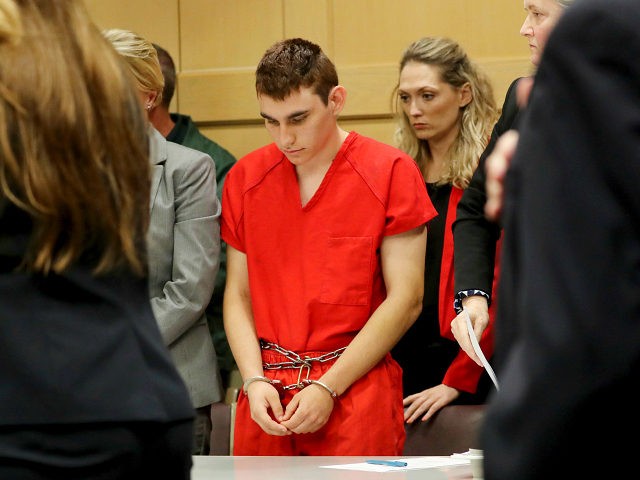Confessed Parkland, Florida, school shooter Nikolas Cruz was identified as a “disabled” student, but school officials botched his request for special services in the year leading up to the shooting massacre at Marjory Stoneman Douglas High School, according to a report a judge ordered to be released to the public.
Broward County Circuit Judge Elizabeth Scherer ordered that a consultant’s report, commissioned by the Broward school district, be released to the public with about two-thirds of the content blacked out to protect Cruz’s privacy rights, reports the Sun Sentinel. School officials’ attempt to conceal the blacked-out text, however, failed, and information about the shooter’s school history was subsequently easily accessed.
The Sentinel writes:
Without directly criticizing the schools, the consultant, the Collaborative Educational Network of Tallahassee, recommended that the district reconsider how cases like Cruz’s are handled. The recommendations suggest that Cruz could have been offered more help in his final two years in high school, leading up to the Feb. 14 shooting.
…
The consultant found that the district largely followed the laws, providing special education to the shooter starting when he was 3 years old and had already been kicked out of day care. But “two specific instances were identified,” the report says, where school officials did not follow the requirements of Florida statute or federal laws governing students with disabilities.
The report notes that Broward school officials did not accurately state Cruz’s options when he was about to be removed from Marjory Stoneman Douglas High School – where he ultimately killed 17 people. The inaccuracies reportedly led Cruz to ultimately reject special education services in a therapeutic environment when, at 18, he signed a form stating he would give up special services to remain a regular student at Douglas.
Secondly, the school district “did not follow through” when Cruz requested to return to the Cross Creek therapeutic school for disabled students, the report states.
Both factors, in part, led Cruz to miss out on special services, such as counseling, in the year leading up to the shooting massacre on February 14.
“By all reports the placement at Cross Creek was effective,” the report states. Cruz would have likely remained at Cross Creek had the district not moved him to a regular “mainstream” education setting at Marjory Stoneman Douglas High School.
The school district also decided to discontinue Cruz’s behavior intervention plan because his “target behaviors were no longer in evidence and the plan was no longer needed.”
Cruz became a full-time student at Douglas in January 2016. Three weeks later, however, the Broward Sheriff’s Office received a tip that Cruz posted on Instagram his intention to shoot up the school.
Nevertheless, the consultant’s report states, “Based on the available evidence, the student’s transition to the less restrictive environment of a traditional school campus was appropriate.”
Broward Superintendent Robert Runcie said his officials did not intend to post the report with the redacted portions accessible.
“I didn’t even know that was possible,” he told the Sentinel but asserted that the details mistakenly revealed about Cruz’s lack of therapeutic services do not change the conclusions about the shooting.
“Nobody ever said this was an average child,” Runcie said of Cruz. “The district was the one — out of all the agencies — that was providing some level of service to the child.”
The consultant’s report describes Cruz as a young person with “clinically significant levels of hyperactivity, aggression, anxiety, and depression behaviors and feelings at school.”
The Sentinel adds:
In the past, Runcie said that when Cruz turned 18 and rejected special education placement, the district could no longer provide him with the services given to students with emotional and behavioral disabilities. But the consultant’s report reveals for the first time that Cruz himself requested to return to special education, and his request went nowhere.
Runcie, who brought the PROMISE program, a social justice program aimed at eliminating the “school-to-prison pipeline,” to Broward County, said the consultant’s report largely reveals that the district’s “systems are appropriate” and that his officials were intent on providing “an education and ongoing, changing behavioral care for Cruz throughout his time in the Broward school system.”
Cruz’s attorneys, however, have painted the confessed shooter as an individual with severe and complex psychological problems. They claim the consultant’s report is a “whitewash” of the school district’s errors.
It was revealed in May that Broward officials were confirming that Cruz had been assigned to the PROMISE program in middle school after both Runcie and the Broward Sheriff’s Office said he did not attend the program “while in high school.”
Additionally, Tracy Clark, a spokeswoman for Runcie, said, “It does not appear that Cruz completed the recommended three-day assignment/placement,” but she added that she did not want to “speculate” as to why he did not.
Cruz had been referred to a PROMISE alternative school facility after vandalizing a school bathroom but failed to complete his placement there.

COMMENTS
Please let us know if you're having issues with commenting.